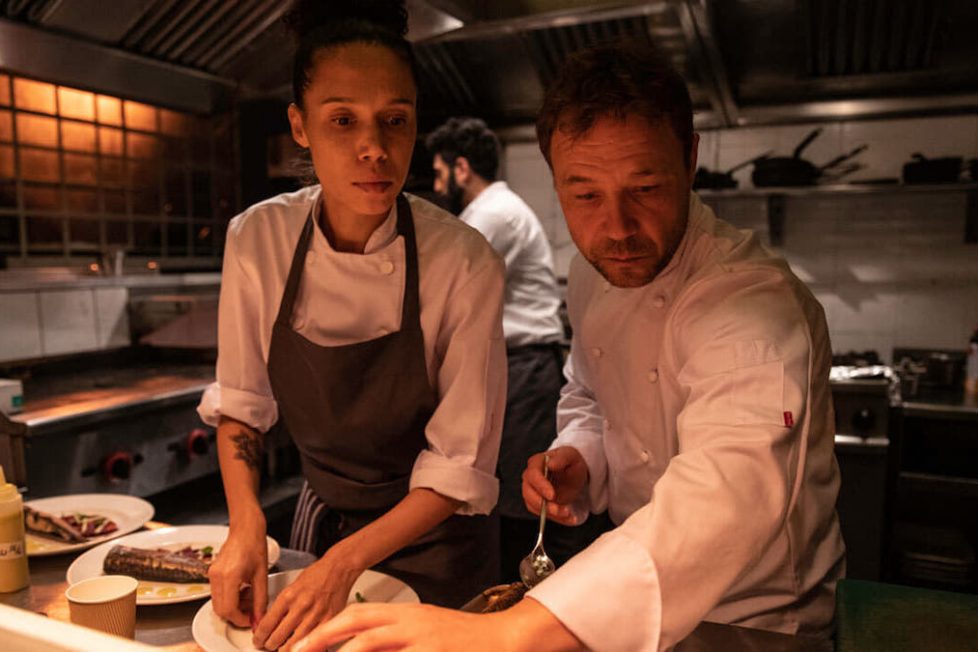BOILING POINT (2021)
A chef’s chaotic personal life creates increasingly serious problems for staff and customers at his restaurant

A chef’s chaotic personal life creates increasingly serious problems for staff and customers at his restaurant


So much of the flavour in Philip Barantini’s second feature comes from his superb ensemble cast that the high drama with which he garnishes Boiling Point seems barely necessary. This portrayal of one night in a London restaurant kitchen—feeling impressionistic at first, but in fact, tightly plotted—would be equally successful if it only depicted the typical workday spats and shouting matches and moments of tenderness among the staff, without resorting to life-and-death tension.
Still, although a moment involving a customer’s nut allergy is signposted with such an obvious Chekhov’s Gun that the audience spends the next few scenes playing spot-the-nut, the more sensational aspects of the film do nothing to detract from its credible atmosphere or the thoroughly engaging characters, who are all flawed but portrayed with empathy. (Well, perhaps not all of them, as there’s not a lot of understanding shown toward the difficult customer who seems to enjoy patronising a young waitress, or the guy claiming to be a social media influencer demanding steak and chips when it’s not on the menu while calling the manager “darling”. But they probably don’t deserve it.)
Based on Barantini’s 2019 own short of the same name (just preceding his feature debut Villain last year), Boiling Point begins late on a December afternoon, where it’s already dark. Christmas is approaching but head chef Andy (Stephen Graham) shows few signs of seasonal contentment as he hurries to his restaurant, speaking to his estranged partner on the phone as he goes, clearly missing his young son. On arrival, he finds a food safety inspector—the annoyingly chummy mansplainer Mr Lovejoy (Thomas Coombes), already well into a fault-finding session—and it seems the restaurant’s hygiene rating is about to be downgraded, largely because of gaps in records Andy’s responsible for keeping.
Other failings also become quickly apparent (not ordering supplies in time, not labelling food properly…), and it’s easy to surmise these are connected to Andy’s troubles at home, as well as the alcohol and drug abuse which becomes more obvious as the story progresses. The scene’s clearly set for things to get worse, but will it be Andy alone who hits rock bottom, or will he drag the restaurant and his co-workers down with him?
While Andy’s the principal focus of Boiling Point (magnificently created by Graham with just the right mix of professionalism and confidence, unprofessionalism and unease), Barantini and co-writer James Cummings give plenty of time to the rest of the team too, as their strengths and worries unfold simultaneously. Singling out names when they’re all so spot-on is difficult, but Andy’s second-in-command Carly (Vinette Robinson) is certainly among the most memorable, being a calm foil to her difficult boss at first but exploding once she’s pushed too far.
“You talk to us all like we are the dirt on the bottom of your fucking shoe,” she says to the manager Beth (Alice Feetham). She’s right, but then we see a new side of Beth as she locks herself in the toilet, cries, calls her dad, and makes it clear she’s unhappy in her job and aware she’s unliked. Nobody in Boiling Point is perfect but everyone (except perhaps the offensive customers) has at least a partial excuse in terms of being a complicated human. There are no heroes or villains here.
Ray Panthaki is also striking as a kitchen worker who’s unafraid to speak out, as his performance beautifully blends determination with slight touches of hesitancy and saying a great deal about the character in the process; while Daniel Larkai as a kitchen porter and Alex Heath as a young pastry chef with a sad secret are among several other stand-outs.
But the most crucial to the narrative, perhaps, is the unbearable celebrity chef—and former employee of Andy—Alastair Skye (Jason Flemyng), who comes unexpectedly to eat at the restaurant and brings with him a food critic (interestingly a much nicer person) played by Lourdes Faberes. Skye, an arrogant man whose every word of praise contains an implicit dig, might almost be Andy’s insecurities personified, but even he turns out to have his own fears eating away at him.
Boiling Point is immersively shot in a single take by Matthew Lewis, the technique never seeming contrived (as it so often can, for example in Sam Mendes’s 1917), with almost the entire film set within the restaurant’s walls, following one character with the camera and then leaving them to pick up another comes across as completely natural. The effect is that we’re watching a fly-on-the-wall documentary rather more than a self-conscious cinematic exercise. There’s undoubtedly complex choreography happening beneath what we’re seeing on film, but it doesn’t show, much like the hectic kitchen activity in a fine restaurant.
Nearly everything in Boiling Point works seamlessly, even if that nut allergy (at unlucky table 13) is too much, and while superficially it might be considered a foodie film… in reality it’s that rare thing: a movie that realistically captures the way people and their jobs intersect. Most such films deal with people too beautiful or larger-than-life to be plausible, or make their work too heroic or too dismal (a restaurant-set example being 2015’s Burnt). But Boiling Point almost entirely avoids such traps, and with such a strong cast it’s a thoroughly engrossing 92-minutes that’ll leave you wanting a second helping.
UK | 2021 | 92 MINUTES | 2.35:1 | COLOUR | ENGLISH
director: Philip Barantini.
writers: Philip Barantini & James Cummings.
starring: Stephen Graham, Vinette Robinson, Alice Feetham, Hannah Walters & Malachi Kirby.
